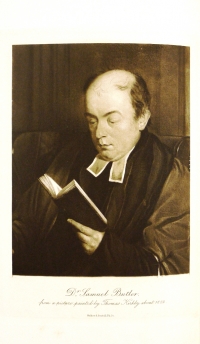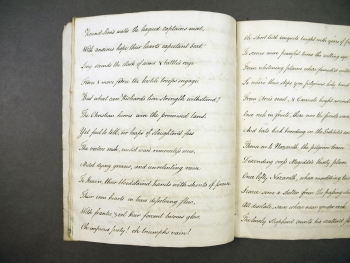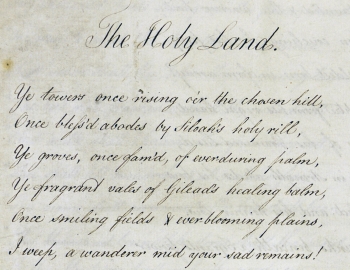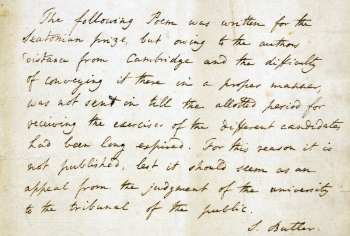The tempting ore
Not the Samuel Butler of the Butler Project, nor indeed the Samuel Butler who wrote Hudibras, the Samuel Butler (1774-1839) with whom this Spotlight is concerned was the former’s grandfather. A Johnian, he matriculated in 1791 and was made a Fellow in 1797, a year before becoming headmaster of Shrewsbury School, an institution that he would significantly revitalise. And, while one probably could not argue equivalent importance for this achievement, in 1800 he wrote a poem entitled ‘The Holy Land’ for submission to Cambridge’s Seatonian Prize.
The Prize emerged from a bequest by the Rev. Thomas Seaton of Clare College, who died in 1741 and specified the following in his will:
I give my Kislingbury Estate to the University of Cambridge for ever: the Rents of which shall be disposed of yearly by the Vice-Chancellor for the time being, as he the Vice-Chancellor, the Master of Clare-Hall, and the Greek Professor for the time being, or any two of them shall agree. Which three persons aforesaid shall give out a Subject, which Subject shall for the first Year be one or other of the Perfections or Attributes of the Supreme Being, and so the succeeding Years, till the Subject is exhausted; and afterwards the Subject shall be either Death, Judgment, Heaven, Hell, Purity of Heart, &c. or whatever else may be judged by the Vice-Chancellor, Master of Clare-Hall, and Greek Professor, to be most conducive to the honour of the Supreme Being and recommendation of Virtue. And they shall yearly dispose of the Rent of the above Estate to that Master of Arts, whose Poem on the Subject given shall be best approved by them. Which Poem I ordain to be always in English, and to be printed; the expense of which shall be deducted out of the product of the Estate, and the residue given as a reward for the Composer of the Poem, or Ode, or Copy of Verses.
 In essence: every year poems on a set religious theme would be considered, with the prize going to the best. The Prize is awarded to this day, administered through the Faculty of Divinity. Byron mentions it in his satire ‘English Bards and Scotch Reviewers’, although not in the most glowing terms:
In essence: every year poems on a set religious theme would be considered, with the prize going to the best. The Prize is awarded to this day, administered through the Faculty of Divinity. Byron mentions it in his satire ‘English Bards and Scotch Reviewers’, although not in the most glowing terms:
Shall hoary Granta call her sable sons,
Expert in science, more expert at puns?
Shall these approach the muse? ah, no! she flies,
Even from the tempting ore of Seaton’s prize
Did the muse fly from Butler? The question was of little relevance to the Prize, actually, since, despite having written a piece on the matter of ‘The Holy Land’, Butler did not manage to submit in time, as he explains on the cover of the manuscript copy held in the Old Library.
The following Poem was written for the Seatonian Prize, but owing to the author’s distance from Cambridge and the difficulty of conveying it there in a proper manner, was not sent in till the allotted period for receiving the exercises of the different candidates had been long expired. For this reason it is not published, lest it should seem as an appeal from the judgment of the university to the tribunal of the public.
The meandering excuse for late submission of work will be depressingly familiar to most readers one way or another. Yet there is some redemptive charm in Butler’s unwillingness to publish the poem for fear of seeming deliberately to circumvent the judges’ decision, even when his poem was not even technically an entry.
What might the judges have thought of it? If the guidelines for topic selection are anything to go by, the winning poem would be the one considered ‘most conducive to the honour of the Supreme Being and recommendation of Virtue’, but presumably the judgement would come down to aesthetics, all examples of honour and recommendation being far more distinguishable in the practiced product than in the principled intention. Both aesthetically and philosophically, Butler’s poem may have been found lacking. The rhyming couplets often merely go through their formal motions, the poem rather outstaying its welcome as a result of jingling filler material; this prioritising of acoustics does, however, mean that Butler finds himself depicting a conflicted state of mind, in a manner that is exciting but not necessarily desirable. The fervour with which he hymns the Crusades can make the ‘virtue’ of military supremacy seem his focus, and while his recurring image is that of shepherding, God as a vengeful slaughterer (and imperialist Anglophile) is more vividly depicted:
For this thy God incensed shall bring from far
A mighty nation, strange & fierce in war:
Swift as the imperial bird in heavens profound,
Eager to seize, & merciless to wound.
Yet this Old Testament jingoism sits uncomfortably with an arguably more Christian humanism, as evidenced by this passage, wherein the poet seems uncertain line-to-line as to where he stands on the matter:
 Long sounds the clash of arms & battle’s rage.
Long sounds the clash of arms & battle’s rage.
Fierce & more fierce the hostile troops engage.
But what can Richard’s lion strength withstand?
The Christian heroes win the promised land.
Yet foul to tell, o’er heaps of slaughter’d foes
The victors rush, midst war’s remorseful woes,
Midst dying groans, and unrelenting raise
To Heav’n their bloodstained hands with shouts of praise.
Their iron hearts in tears dissolving flow,
With frantic zeal their fervent bosoms glow.
Oh impious piety! oh triumphs vain!
Oh short liv’d conquets bought with years of pain!
‘Conquets’ is true to the manuscript. Did Butler intend ‘conquest’ or multiple 'conquests', multiple past and future Pyrrhic victories? The poem becomes a more serene depiction of heavenly paradise in its final pages, thus engaging more directly, if unimaginatively, with ‘the honour of the Supreme Being’; but, the implications of supremacy having been subjected to analysis, this vision of uncomplicated peace does not ring quite true.
The Prize that year went to Francis Wrangham of Trinity. The theme for 2015 is ‘A Nocturnal upon St Lucy’s Day’, and information about how to enter can be found here.
This Special Collections Spotlight article was contributed on 7 May 2015 by Adam Crothers, Library Assistant.

